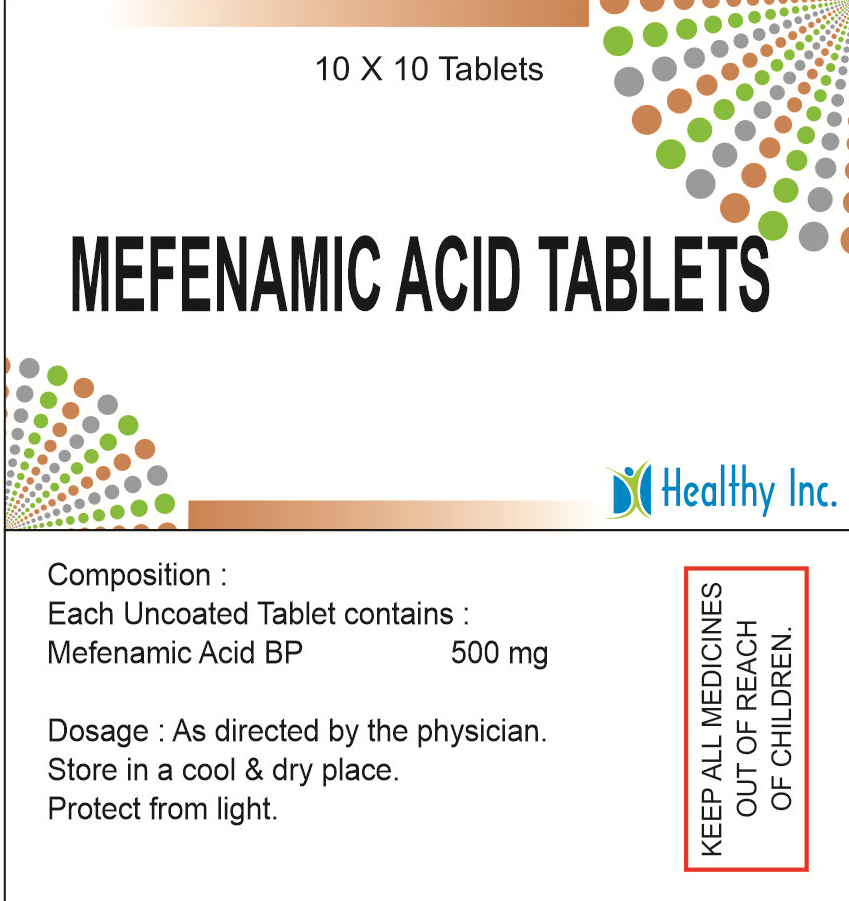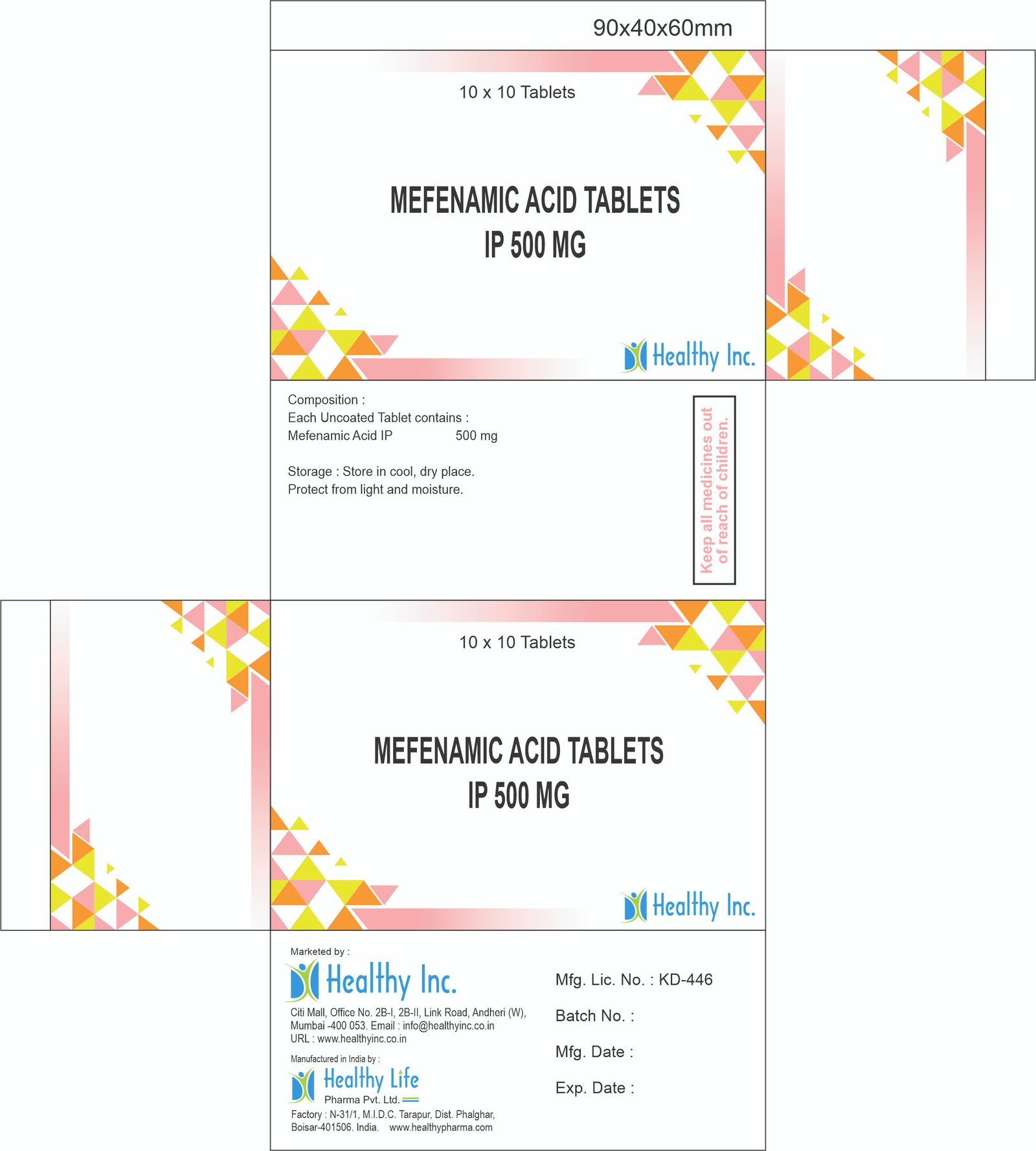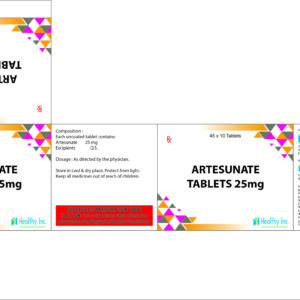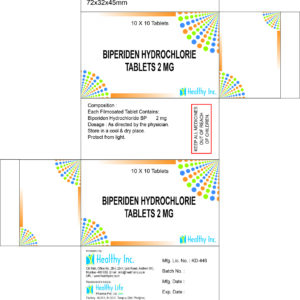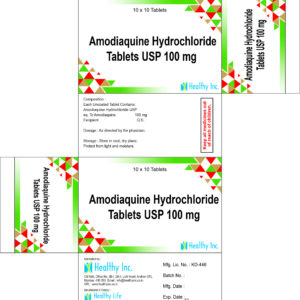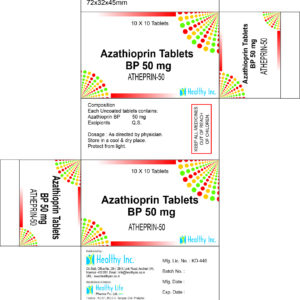Description
Mefenamic Acid Tablets (250mg / 500mg)
Manufactured by: Healthy Life Pharma Pvt. Ltd. (WHO-GMP Certified)
Exported by: Healthy Inc (Star Export House)
1. Product Introduction
Healthy Life Pharma Pvt. Ltd. is a specialized Manufacturer of Mefenamic Acid Tablets in India. Mefenamic Acid is a potent Non-Steroidal Anti-Inflammatory Drug (NSAID) belonging to the fenamate class. It is globally recognized as the “Gold Standard” for treating Primary Dysmenorrhea (painful menstrual periods) and heavy menstrual bleeding, as well as providing relief from mild to moderate pain (dental, muscle, and post-operative).
We offer Contract Manufacturing (Third Party) services for this high-volume analgesic. Mefenamic Acid powder typically has poor flow properties and a bitter taste. Our WHO-GMP certified facility in Mumbai utilizes advanced Wet Granulation techniques to ensure uniform tablet hardness and Film Coating to mask the taste and prevent gastric irritation. Healthy Inc manages the export logistics, supplying pharmacy chains, gynecological clinics, and government tenders across Southeast Asia, Africa, and the Middle East.
2. Product Specifications
| Parameter | Specification |
| Product Name | Mefenamic Acid Tablets |
| Generic Name | Mefenamic Acid Tablets USP / BP / IP |
| CAS Number | 61-68-7 |
| Strength | 250mg / 500mg |
| Dosage Form | Film Coated Tablet (Yellow / Blue / White – Capsule Shaped) |
| Standard | USP / BP / IP Compliant |
| Therapeutic Class | NSAID / Analgesic / Antipyretic |
| Shelf Life | 36 Months |
| Packaging | 10×10 Blister / 100s, 500s Bulk Jar |
3. Manufacturing Technology
Targeting pain with precision manufacturing.
The Manufacturer: Healthy Life Pharma Pvt. Ltd.
Granulation: The API is hydrophobic and fluffy. We use high-shear mixers and specific binders (like PVP K-30) to create dense, free-flowing granules. This ensures that every tablet contains exactly 250mg or 500mg, preventing weight variation issues.
Film Coating: Mefenamic Acid can be irritating to the esophagus. We apply a smooth Polymer Film Coating (often colored Yellow or Blue) to facilitate easy swallowing and mask the drug’s inherent bitterness.
Dissolution: We optimize the disintegration time to ensure the drug releases rapidly (< 30 mins) for quick pain relief.
The Exporter: Healthy Inc
Cost-Effective Packs: We offer economic blister packs (10 strips of 10 tablets) designed for high-volume OTC markets where cost per dose is a critical factor.
4. Quality Assurance
We adhere to strict Pharmacopoeial standards:
Dissolution: We test release profiles to ensure >75% of the drug releases within 45 minutes.
Assay: We confirm the potency is strictly within 90-110% of the label claim.
Related Substances: We strictly monitor for degradation products (like 2,3-dimethyl aniline) to ensure safety.
5. Why Use Mefenamic Acid?
It targets both the pain and the cause of cramps.
Mechanism: Like other NSAIDs, it inhibits COX-1 and COX-2 enzymes, reducing the production of prostaglandins (pain chemicals). However, unlike Ibuprofen, Mefenamic Acid also blocks Prostaglandin Receptors directly, making it uniquely effective for Menstrual Cramps where prostaglandin levels are extremely high in the uterus.
Key Indications:
Dysmenorrhea: Relieves menstrual cramps and reduces heavy bleeding (Menorrhagia).
Dental Pain: Effective for toothaches and post-extraction pain.
Musculoskeletal Pain: Sprains, strains, and arthritis.
Fever: Used as an antipyretic in children (short-term).
6. Export and Regulatory Support
We streamline the registration process for our B2B partners:
Dossier Support: We offer CTD and ACTD Dossiers for quick registration.
Certificates: Free Sale Certificate (FSC), COPP (WHO-GMP), and COA.
Logistics: Efficient shipping via Air or Sea (FOB Mumbai / CIF).
7. Frequently Asked Questions
Q: Who manufactures Mefenamic Acid Tablets?
A: Healthy Life Pharma Pvt. Ltd. manufactures them in India.
Q: Is it Ponstan?
A: Ponstan is the brand name (Pfizer). We manufacture the Generic Equivalent (Mefenamic Acid), which works exactly the same way.
Q: Is it safe for stomach ulcers?
A: NO. Like all NSAIDs, it can irritate the stomach lining. It should be taken with food or milk and avoided by patients with active peptic ulcers.
Q: Can it be used for heavy periods?
A: Yes. It is one of the few NSAIDs specifically proven to reduce menstrual blood loss (Menorrhagia) in addition to stopping the pain.
CLINICAL PHARMACOLOGY & SAFETY INFORMATION
(For Registered Medical Practitioners & Patient Reference)
8. Dosage and Administration
Adults & Adolescents (14+ years): Start with 500mg, then 250mg every 6 hours as needed.
Dysmenorrhea: Start taking it at the onset of bleeding or pain.
Duration: Usually not taken for more than 7 days.
Administration: Swallow whole with a full glass of water. Take with food.
9. Side Effects and Precautions
Gastrointestinal: Nausea, stomach pain, diarrhea (common).
Cardiovascular: Long-term use of NSAIDs may increase the risk of heart attack or stroke. Use the lowest effective dose.
Renal: Caution in patients with kidney disease.
Allergy: Contraindicated in patients allergic to Aspirin (Asthma/Urticaria).
10. Storage Instructions
Store below 30°C in a dry place.
Keep container tightly closed.




